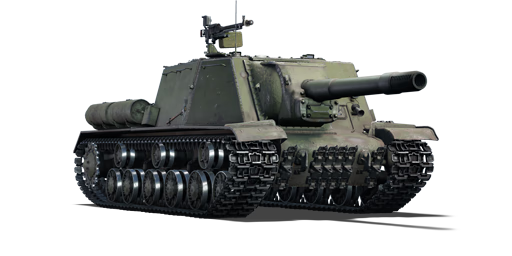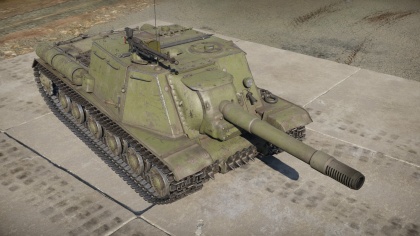Difference between revisions of "ISU-152 (China)"
(→Pros and cons) (Tag: Visual edit) |
(added information for the turret rotation section) (Tag: Visual edit) |
||
| Line 60: | Line 60: | ||
! style="width:4em" |Prior + Ace qualif. | ! style="width:4em" |Prior + Ace qualif. | ||
|- | |- | ||
| − | | ''Arcade'' || | + | | ''Arcade'' ||7.0|| _.__ || _.__ || __._ || __._ |
|- | |- | ||
| − | | ''Realistic'' || | + | | ''Realistic'' || 4.8 || _.__ || _.__ || __._ || __._ |
|- | |- | ||
! colspan="4" | Reloading rate (seconds) | ! colspan="4" | Reloading rate (seconds) | ||
Revision as of 07:53, 1 June 2020
Contents
Description
The ␗ISU-152 is a rank Chinese tank destroyer
with a battle rating of (AB), (RB), and (SB). It was introduced in Update 1.91 "Night Vision".
General info
Survivability and armour
Armour type:
- Rolled homogeneous armour
- Cast homogeneous armour (Gun mantlet)
| Armour | Front | Sides | Rear | Roof |
|---|---|---|---|---|
| Hull | 60 mm (75°) Front glacis 90 mm (31°) Lower glacis |
90 mm | 60 mm (50°) Top 60 mm (39°) Bottom |
30 mm |
| Superstructure | 90 mm (29°) Front glacis 65 mm (7-69°) Gun mantlet case 100 mm Gun mantlet (0-45°) |
75 mm (14-15°) | 60 mm (1°) | 30 mm |
Notes:
- Suspension wheels are 20 mm thick while tracks are 30 mm thick.
Mobility
| Game Mode | Max Speed (km/h) | Weight (tons) | Engine power (horsepower) | Power-to-weight ratio (hp/ton) | |||
|---|---|---|---|---|---|---|---|
| Forward | Reverse | Stock | Upgraded | Stock | Upgraded | ||
| Arcade | Expression error: Unexpected * operator. | 739 | Expression error: Unexpected round operator. | __.__ | |||
| Realistic | 460 | Expression error: Unexpected round operator. | __.__ | ||||
Armaments
Main armament
| 152 mm ML-20S | |||||
|---|---|---|---|---|---|
| Capacity | Vertical guidance |
Horizontal guidance |
Stabilizer | ||
| 20 | -3°/+20° | -3°/+7° | N/A | ||
| Turret rotation speed (°/s) | |||||
| Mode | Stock | Upgraded | Prior + Full crew | Prior + Expert qualif. | Prior + Ace qualif. |
| Arcade | 7.0 | _.__ | _.__ | __._ | __._ |
| Realistic | 4.8 | _.__ | _.__ | __._ | __._ |
| Reloading rate (seconds) | |||||
| Stock | Prior + Full crew | Prior + Expert qualif. | Prior + Ace qualif. | ||
| 27.7 | __.__ | __.__ | __.__ | ||
Ammunition
| Penetration statistics | |||||||
|---|---|---|---|---|---|---|---|
| Ammunition | Type of warhead |
Penetration in mm @ 90° | |||||
| 10m | 100m | 500m | 1000m | 1500m | 2000m | ||
| BR-540 | APHE | 170 | 169 | 161 | 152 | 144 | 136 |
| OF-540 | HE | 65 | 65 | 64 | 64 | 63 | 63 |
| BR-540B | APHEBC | 166 | 164 | 157 | 148 | 140 | 133 |
| BP-540 | HEAT | 250 | 250 | 250 | 250 | 250 | 250 |
| Shell details | ||||||||||
|---|---|---|---|---|---|---|---|---|---|---|
| Ammunition | Type of warhead |
Velocity in m/s |
Projectile Mass in kg |
Fuse delay
in m: |
Fuse sensitivity
in mm: |
Explosive Mass in g (TNT equivalent): |
Normalization At 30° from horizontal: |
Ricochet: | ||
| 0% | 50% | 100% | ||||||||
| BR-540 | APHE | 600 | 49 | 1.2 | 15 | 816 | -1° | 47° | 60° | 65° |
| OF-540 | HE | 655 | 44 | 0.1 | 0.5 | 5,900 | +0° | 79° | 80° | 81° |
| BR-540B | APHEBC | 600 | 49 | 1.2 | 15 | 1,120 | +4° | 48° | 63° | 71° |
| BP-540 | HEAT | 680 | 48.8 | - | 0.1 | 5,910 | +0° | 62° | 69° | 73° |
Machine guns
Offensive and anti-aircraft machine guns not only allow you to fight some aircraft but also are effective against lightly armoured vehicles. Evaluate machine guns and give recommendations on its use.
Usage in battles
Describe the tactics of playing in the vehicle, the features of using vehicles in the team and advice on tactics. Refrain from creating a "guide" - do not impose a single point of view but instead give the reader food for thought. Describe the most dangerous enemies and give recommendations on fighting them. If necessary, note the specifics of the game in different modes (AB, RB, SB).
Pros and cons
Pros:
- Deadly cannon provides superior one-shot capacity with any target upon penetration
- Powerful HEAT penetrates up to 250mm which is very effective in a full uptier. For example the early Centurions, Ferdinand, Tiger II H can all get penetrated with ease.
- The huge gun mantlet and its complex armor layout is capable of deflecting quite some shells sometimes.
- 30mm roof armor resists popular aircraft weapons well, like the 12.7mm M2 with ground target belt and the MG 151.
- All-round protection provides good resistance against flanking SPAAs. The M19 / M42 are very common flankers.
Cons:
- Long reload of more than 20 seconds and the rather curved trajectory demands very precise aiming, which isn't beginner friendly.
- Front armour is only 75mm and is not well angled. Gets penetrated easily by common guns at the BR, like the 76mm M1, 17 pdr, 75mm and 88mm.
- Closely packed crew all easily get killed when an explosive shell penetrates.
- Very inadequate gun depression of -3° combined with the sluggish mobility makes it only capable of fighting in urban (flat) areas, but never the hills.
- Turretless layout and the sluggish mobility makes it very vulnerable to surprise flankers, for example the infamous M18, T20, T25 and Puma.
- Gun breech often gets damaged while under enemy fire.
History
Development
Development of the ISU-152 already started alongside the SU-152, its predecessor. The SU-152 was based off the KV-1S tank, which itself is a lighter version of the KV-1 heavy tank. The vehicle, while highly praised in its performance, saw a need for modernization with the KV-1's phasing out of the Soviet's inventory and being replaced with the new IS heavy tanks. The modernization process began on May 25, 1943, with the goal of using the IS tank as the basis of the vehicle and also increasing armour protection alongside other improvements. Development began in July under Joseph Yakovlevich Kotin, a chief designer of Soviet heavy tanks, who worked alongside G. N. Moskvin as the main designer. The designing of the improved vehicle went on for a month before the first variant was ready, designated the IS-152. This was tested in September 1943, which revealed defects and deficiencies with the design, so it was redone into a second variant called Object 241 in October 1943. Trials began on Object 241, which was successful through the factory and state trials and adopted on November 6, 1943, as the ISU-152. Production began in December at the Chelyabinsk Kirovsk Plant, producing 3,242 units from then all the way until 1947, with 1,885 units made by the end of World War II.
Design
The ISU-152 was the successor to the SU-152, retaining the same 152 mm ML-20S howitzer needed to destroy enemy fortifications in offensive operations. The vehicle was run on a torsion-bar suspension system from the IS tank chassis. The crew consists of four or five men in the vehicle, the optional crew member being a loader. The crew had external views through periscopes and two gun sights, a panoramic and a telescopic one. Crew communication was possible with an intercom system and a 10R or 10RK radio was available to communicate between vehicles. The crew had access to two PPSh submachine guns and grenades in the tank to defend themselves against infantry.
A drawback to the vehicle's design was the gun ammunition and internal storage. The large ammunition pieces were limited to about 20 rounds in the vehicle, and each round was extremely heavy and large that reloading the tank can take up to 40 minutes and lots of strength. Rate of fire was also reduced by the ammunition's heavyweight.
Combat usage
In-game description
Media
Excellent additions to the article would be video guides, screenshots from the game, and photos.
See also
Links to the articles on the War Thunder Wiki that you think will be useful for the reader, for example:
- reference to the series of the vehicles;
- links to approximate analogues of other nations and research trees.
External links
Paste links to sources and external resources, such as:
- topic on the official game forum;
- encyclopedia page on the tank;
- other literature.
| China tank destroyers | |
|---|---|
| PLA | |
| Gun vehicles | PLZ83 · PLZ83-130 · PLZ05 · PTZ89 |
| Missile vehicles | AFT09 |
| ROC | |
| Missile vehicles | CM25 |
| USA | |
| Gun vehicles | ␗M8 HMC · LVT(A)(4) (ZiS-2) · ␗M10 GMC · ␗M36 GMC |
| Missile vehicles | ␗M113A1 (TOW) |
| USSR | |
| Gun vehicles | ␗SU-76M · ␗ISU-152 · ␗ISU-122 · ␗SU-100 |





